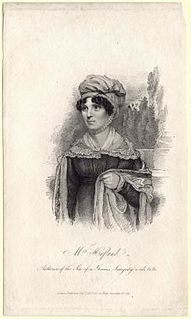
The East India Company College, or East India College, was an educational establishment situated at Hailey, Hertfordshire, nineteen miles north of London, founded in 1806 to train "writers" (administrators) for the Honourable East India Company (HEIC). It provided general and vocational education for young gentlemen of sixteen to eighteen years old, who were nominated by the Company's directors to writerships in its overseas civil service. It closed in 1858.

Manchester city centre is the central business district of Manchester, England, within the boundaries of Trinity Way, Great Ancoats Street and Whitworth Street. The City Centre ward had a population of 17,861 at the 2011 census.

General Sir Edward Paget was a British Army officer.
The Düsseldorf school of painting refers to a group of painters who taught or studied at the Düsseldorf Academy in the 1830s and 1840s, when the Academy was directed by the painter Wilhelm von Schadow. The work of the Düsseldorf School is characterized by finely detailed yet fanciful landscapes, often with religious or allegorical stories set in the landscapes. Leading members of the Düsseldorf School advocated "plein air painting", and tended to use a palette with relatively subdued and even colors. The Düsseldorf School grew out of and was a part of the German Romantic movement. Prominent members of the Düsselorf School included von Schadow, Karl Friedrich Lessing, Johann Wilhelm Schirmer, Andreas Achenbach, Hans Fredrik Gude, Oswald Achenbach, and Adolf Schrödter.

James Gillespie Graham was a Scottish architect, prominent in the early 19th century.
William Nassau Molesworth (1816–1890) was an English priest and historian.
The Stotts were a family of architects from Oldham, North West England, of Scottish descent who specialised in the design of cotton mills. James Stott was the father, Joseph and his elder brother Abraham Stott had rival practices, and in later years did not communicate. Their children continue their practices.

The Livingston family of New York is a prominent family that migrated from Scotland to the Dutch Republic, and then to the Province of New York in the 17th century. Descended from the 4th Lord Livingston, its members included signers of the United States Declaration of Independence and the United States Constitution. Several members were Lords of Livingston Manor and Clermont Manor, located along the Hudson River in 18th-century eastern New York.
Joseph Nightingale was a prolific English writer and preacher. He was particularly noted for his topographic writing and his interest in shorthand.

Barbara Hofland was an English writer of some 66 didactic, moral stories for children, and of schoolbooks and poetry. She was asked by John Soane to write a description of his still extant museum in London's Lincoln's Inn Fields.
James Pigot was a British publisher of directories, and a pioneering publisher of trade directories.
David William Paynter (1791–1823) was an English author.
Alport Town was a district of Manchester, England, that included over 300 houses. It was effectively wiped out by the construction of the Great Northern Warehouse and its ancillary buildings and roads in the 1890s. Known by several names over a period of years, including Aldeparc, Aldport, Over Alporde, Nether Alteport, Alporton, Hooperton and Upperton, the area was known as Alport or Alport Town around the time of its demise.
The public domain consists of all the creative works to which no exclusive intellectual property rights apply. Those rights may have expired, been forfeited, expressly waived, or may be inapplicable.

The Dictionary of National Biography (DNB) is a standard work of reference on notable figures from British history, published since 1885. The updated Oxford Dictionary of National Biography (ODNB) was published on 23 September 2004 in 60 volumes and online, with 50,113 biographical articles covering 54,922 lives.











